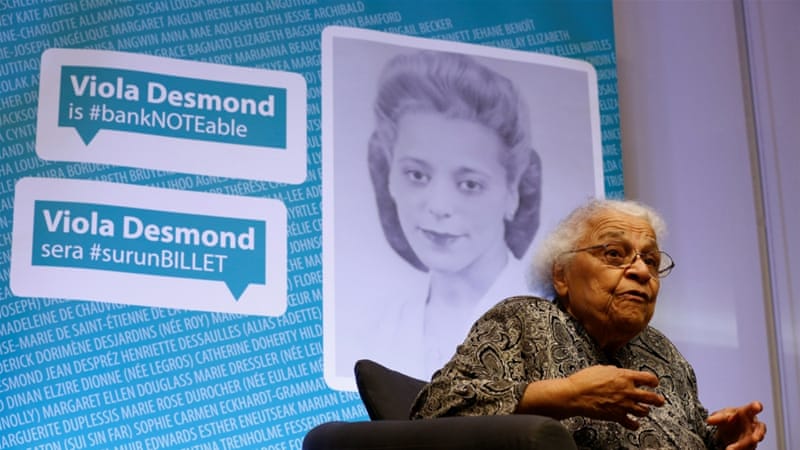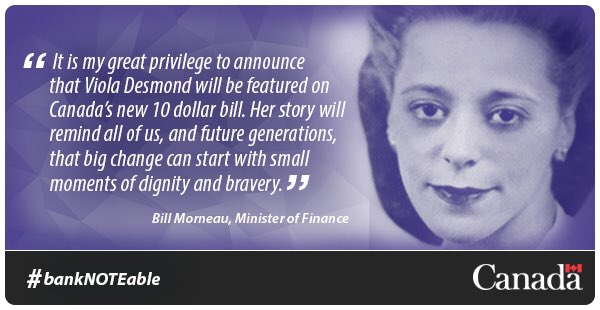Desmond fought racial segregation in the 1940s after refusing to give up a seat in a “whites only” section of a cinema.
By Jillian Kestler-D’Amours
Aljazeera, December 8, 2016 —

Desmond’s sister, Wanda Robson, was present at the announcement on Thursday [Reuters]
Toronto, Canada – A black civil rights leader who led a struggle against anti-black segregation and racism in Canada in the 1940s will be the first Canadian woman to figure on a banknote.
Viola Desmond will appear on the Canadian $10 bill – replacing the nation’s first prime minister John A Macdonald who will be moved to a higher bill – when new banknotes go into circulation in 2018, Canadian Finance Minister Bill Morneau announced on Thursday morning.
A successful businesswoman from a middle-class family, Desmond is best known for refusing to give up her seat in the “whites only” section of a cinema in Canada’s eastern province of Nova Scotia in 1946.

It’s my privilege to announce that Viola Desmond will be the first Canadian woman on a bank note. #bankNOTEable. Bill Morneaut @Bill_Morneau
She was eventually dragged out of the segregated cinema by police, arrested, held in prison overnight, and forced to pay a fine, all for refusing to move to the upstairs balcony reserved for black people.
She was criminally charged with not paying a small tax that would normally apply on a downstairs ticket. But instead of letting the matter rest, Desmond decided to fight her conviction in court.
“Viola inspires us … today as she inspired people years ago,” said her sister Wanda Robson, who attended the announcement. “I’m so proud, I’m almost in tears.”
Her case was the first known legal challenge by a black woman against segregation laws in Canada.
Desmond, who died in 1965, had the support of local black community leaders and the Nova Scotia Association for the Advancement of Coloured People, among others.
In 2010, she received a posthumous pardon from the province of Nova Scotia.
“I just think this is great. It’s very inspiring. I am inspired, as a black Canadian woman,” said Afua Cooper, the James Robinson Johnston Chair in Black Canadian Studies at Dalhousie University in Halifax, told Al Jazeera.
“I think it’s about time Canada recognises its black citizens, people who have suffered,” added Cooper, who is also the founder and chair of the Black Canadian Studies Association.
While she is often compared to Rosa Parks – the civil rights leader who refused to give up her seat at the front of the bus in Montgomery, Alabama, in 1955 – Cooper said Desmond’s case should be viewed within its Canadian context.
Glad to hear #ViolaDesmond is being added to money. I didn’t know much about her. Shame her story wasn’t taught in my Canadian history class. Scott Fox
@ScottFoxonair
“Canada has its own homegrown racism, anti-black racism, and anti-African racism that it has to deal with without comparing it to the US. We live here. We don’t live in America. Desmond lived in Canada,” she said.
Earlier this year, the Bank of Canada launched an open call to nominate iconic Canadian women to appear on the new banknote. After receiving 26,000 submissions, the bank narrowed the list down to 461 women, and five eventually made the shortlist.
Canadian Prime Minister Justin Trudeau described Desmond as a ” businesswoman, community leader, and courageous fighter against racism”, and said putting her on the new bill was “a fantastic choice”.
By and large, most Canadians still do not know much about Desmond’s story. However, having Desmond on the new note is an important step to acknowledging what happened, Cooper said.
“It’s a recognition, it’s an acknowledgement and she deserves it so much because she was such a fantastic woman, and such a hard worker, and for her to be dealt that hand was so unfair.”











